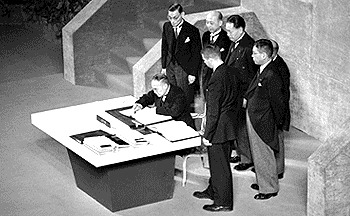Battlefield
Roger C.S. Lin vs United States
由 於 2009-05-02 05:54 PM 發佈 (562 查看)
The 'strategic ambiguity' posed by the long-standing 'Taiwan question' over Taiwan's international status may finally be headed to resolution--not in Taipei but in Washington, D.C.
The District of Columbia U.S. Circuit Court of Appeals has handed the 'Taiwan question' to President Barack Obama with a note marked urgent. In declining to review the 1952 San Francisco Peace Treaty, where Japan ceded all claims to Formosa and the Pescadores Islands that make up Taiwan, the federal appellate court highlighted the urgency of the dispute stating the ambiguity "has trapped the inhabitants of Taiwan in political purgatory."
"Once the Executive determines Taiwan's sovereign, we can decide Appellants' resulting status and concomitant rights expeditiously." said the three-judge panel that was considering Roger C.S. Lin, et al vs. United States.
Thus far, President Obama has kept quiet about his views on Taiwan. Secretary of State Hillary Clinton's first tour to Asia skipped Taiwan on the travel itinerary. Now, armed with the appellate court's language on the urgency of the situation, Congressional supporters of Taiwan independence can be counted on to pressure the White House for action.
Meanwhile, Roger Lin and other Taiwanese plaintiffs are wasting no time preparing an appeal to the United States Supreme Court for a judicial determination that has eluded political leaders for decades. The plaintiffs cite a number of other cases and situations where courts have decided treaty, boundary and citizenship disputes without running afoul of the 'political question' doctrine that keeps courts out of political disputes.
Perhaps most important is a crucial factual error in the recently issued appellate decision that betrays a common misunderstanding of the historical events surrounding Japan's surrender to the United States and the subsequent San Francisco Peace Treaty. In the decision handed down earlier this week the court stated, "After its defeat in World War II, Japan surrendered sovereignty over Taiwan to the Allied Forces in 1945."
Lin spokesperson Richard W. Hartzell explains the court's account is "a commonly seen 'mis-interpretation' of the significance of the surrender ceremonies." Hartzell says, "Specifically, it is totally inappropriate to describe the 'surrender ceremonies' as denoting the surrender of sovereignty of the territory in question. Such a statement confuses the start of' 'military occupation' with annexation."
Charles Camp, a Washington, D.C. attorney with an international practice who argued the case, shares Hartzell's view that the court was tripped up by a common misunderstanding of historical events. "Taiwan was sovereign Japanese territory until ceded in the peace treaty on April 28, 1952."
Hartzell says the rule of Taiwan in the post-World War II era is best described in a classic authoritative text on military governments, Military Law and Precedents, by Warren Winthrop. "Military government…is an exercise of sovereignty, and as such it dominates the country which is its theatre in all the branches of administration. Whether administered by officers of the army of the belligerent, or by civilians left in office or appointed by him for the purpose." Chiang Kai-shek's Republic of China troops were merely the agents of the United States as the 'principal occupying Power' in Taiwan following the Japanese surrender.
The United States' chief negotiator at the San Francisco peace conference was John Foster Dulles. Dulles went into the treaty negotiations with a well developed notion of the problems facing residents of Taiwan. Dulles expressed his views on Taiwan in a letter to Senator Arthur Vandenberg (R-MI).
Dulles wrote it was "scandalous to adopt the theory that Formosa is part of China and that, therefore, the Formosans must be subjected to the cruel fate of being the final battleground between the Red regime and the Nationalist Army."
For more lawsuit info: http://court.civil-taiwan.org/
For more Taiwan info: http://www.examiner.com/x-1969-Boston-Progressive-Examiner~topic72211-Taiwan?selstate=topcat
http://www.examiner.com/x-1969-Boston-Progressive-Examiner~y2009m4d9-Roger-CS-Lin-vs-United-States-Suit-seeks-US-protection-for-Taiwan-selfdetermination-5-of-5



 Email文章
Email文章